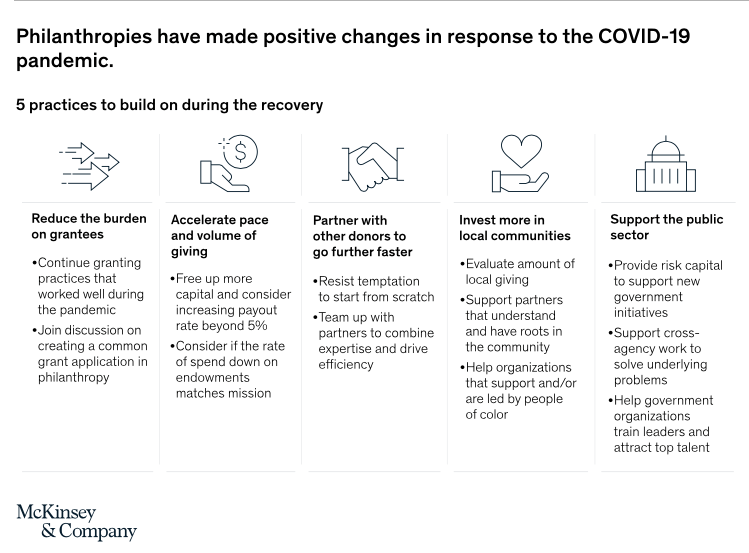Can the Positive Changes in Philanthropy Sown in 2020 Take Root and Grow?
Categorized as: Stories on November 20, 2021.

Editor’s Note: We who work in the world of philanthropy saw an outpouring of positive, responsive, and nimble reaction to the needs of non-profits and communities throughout 2020 due to the onset of the pandemic, the resulting economic upheaval that laid bare so many systemic inequities, and racial reckoning through the Black Lives Matter movement. Many of us understand these changes have been a long time coming. Once the dust settles, will this more grantee-centered approach become standard operating procedure in philanthropy, or will old habits and ways of doing things come creeping back? We challenge our readers to work within your community in any way you can to promote the normalization of these new patterns.
 By Sally Skees-Helly, Director and CFO
By Sally Skees-Helly, Director and CFO
A Multi-Faceted Crisis: Health, Economy, and Justice
Each crisis on its own perhaps would not have created such a sea change in the philanthropic world. But the pandemic fast-tracked the philanthropic sector with funders immediately increasing giving, providing more flexibility in that giving, and reducing or eliminating both reporting and restrictions on funding. Then the economic fallout from the lock down shown a bright light on the inequities of our economic system where “essential workers” put their lives at risk for minimum wage. Funders began focusing more closely on their own communities and the gaps that needed to be filled in the short term, and the underlying reasons for the inequities in the long term. With George Floyd’s murder and the world-wide wave of the Black Lives Matter movement, many in the philanthropic community began truly reckoning with systemic racism and their responsibility to change the makeup of philanthropy to better represent the communities they serve.
A visual breakdown from a fascinating article called A Transformative Moment for Philanthropy shows just some of the changes that came about as the pandemic took hold. It was written in May 2020 by McKinsey & Company. The article explains in detail the points made in this visual and why they should be expanded and formalized.
Transformational Change in Three Parts
Although there are specific practices and measures that can be reinforced and expanded, three general areas of change encompass many of these processes.
Trust Based Philanthropy
In the words of trustbasedphilanthropy.org, “At it’s core, trust-based philanthropy is about redistributing power-systemically, organizationally, and interpersonally-in service of a healthier and more equitable nonprofit sector. On a practical level, this includes multi-year unrestricted funding, streamlined applications and reporting, and a commitment to building relationships based on transparency, dialogue, and mutual learning.”
The multi-faceted crisis of 2020 challenged the United States and the world and amplified calls in the philanthropic sector to move beyond questions about the power imbalance to demand meaningful change in the distribution of philanthropic resources. In response, philanthropic organizations in 2020 moved money out their doors at record speed, with fewer conditions both in reporting and as unrestricted funding, and in greater collaboration with other funders.
Intersectionality
We all may be aware of intersectionality as a framework for understanding the complex way that many aspects of people’s identities overlap, including race, gender, sexual orientation, class, physical appearance, and more. This concept can be applied to organizations whose missions overlap and who can work together to create new opportunities. For example, human rights defenders may work in tandem with organizations focused on climate change and its disproportionate impact on developing communities. The problems faced today are far too complex for one funder to solve, so identifying intersectionality opportunities is key.
In 2020, the philanthropic community saw an unprecedented collaboration of funders working together to increase their impact and reduce burdens on grantees and communities. Collaboration across the sector allowed resources to reach the ground faster and in greater amounts.
Participatory Philanthropy
Criminal justice reform advocate Glenn E. Martin said, “Those closest to the problem are closest to the solution.” By truly shifting the power and decision-making in the sector from those who control the resources to those who best know how the resources should be used, will not only ensure more productive solutions, but will begin to address the systemic inequities in the ways wealth has been and is accumulated as well as the ways that wealth in controlled.
Shifting power means participatory grant-making in which activists and communities have the power to decide where and how to allocate resources. Shifting power means bringing those leaders in the field into the board room as advisors, committee members, and board members. Shifting power means understanding that income inequality has shaped, informed, and influenced our entire sector and that change is profoundly needed.
Discussions around diversity, equity, and inclusion over the past months are going further than ever before, and by continuing these conversations, our sector is in a position to truly change our funding priorities and practices.
Has Philanthropy Changed for Good?
It may be too soon to tell whether the changes in philanthropy seen over the past twenty months will “stick”, but the conversations are happening, a new generation is moving into leadership in the sector, and many of us are taking an introspective look at the status quo and finding it wanting.
Let’s hope we can keep moving and growing toward a new concept of philanthropy.
Graphic obtained from McKinsey & Company.
SHARE this story with your networks; see menu at top and bottom of page.
SUBSCRIBE! Like what you see? Click here to subscribe to Seeds of Hope!

